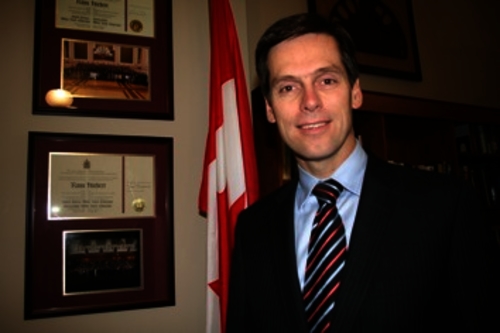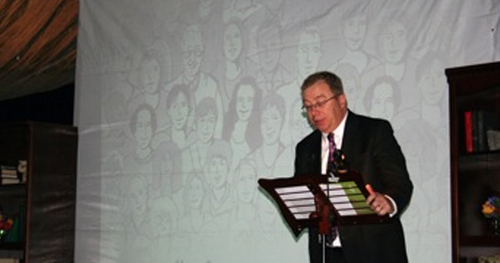The Ontario Alliance of Christian Schools News Service asks Cardus' new Comment Editor, James K.A. Smith his thoughts on the state of Christian education. To read the full interview, click here.

<I> Comment </I> Editor, James K.A. Smith interviewed by OACS <I> News Service </I>
December 6, 2012

Senior Researcher Brian Dijkema quoted in <I> The B.C. Catholic </I>
The B.C. Catholic covers Cardus' research on Bill C-377 from the June edition of CPiP, "Competition or Regulation? Reforming Labour Relations in Canada." Senior Researcher Brian Dijkema discusses the problems with the proposed private member's bill. To read the full article, click here.
December 4, 2012

Cardus researcher Brian Dijkema quoted in the <I> Daily Commercial News</I>
The Daily Commercial News profiles Cardus' latest research in Work and Economics, the Cardus Construction Competitiveness Monitor. To read the full article, click here.
December 3, 2012

Russ Kuykendall quoted in <I> Embassy</I> magazine
Russ Kuykendall, former Cardus research fellow, was quoted in Embassy magazine. The article, found here, references Kuykendall's piece "Clean Energy Superpower or Canadian Energy Strategy?", from the previous edition of Cardus Policy in Public.
November 15, 2012

Conservative bill forcing union disclosure is costly and inefficient
We would ask hard questions about someone who rushes to save a piece of burning toast while his kitchen is on fire. Likewise, questions must be asked about a government that spends enormous time and energy interfering with private institutions while millions of taxpayers dollars are being wasted on public construction projects in Canada. Those federal tax dollars are overspent annually on infrastructure projects due to restrictions on labour competition. At the same time, many unions spend the dues collected from their members on causes that do not have rank-and-file support. Both are real public problems that superficially seem different but are, in fact, intricately linked. Both are solvable through government policy aimed at greater accountability. The accountability can come from either effective government regulation or increased competition. Curiously, with legislation that might have come from the far left of the NDP in another context, Conservative MPs are choosing increased regulation rather than competition. They are earnestly promoting Bill C-377, which orders that any union expense over $5,000 be publicized to all Canadians, not just a unions members. The Parliamentary Budget Officer will conduct a cost analysis of the bill before it returns to committee in the next few weeks. C-377 tries to solve the problem of unions spending money on projects sponsoring Israeli apartheid days or funding student strikes in Quebec, for instance that have nothing to do with the work they should do. Yet its strict provisions outstrip, by a wide measure, the obligations imposed on charities or corporations. Its a classic case of government intervening in private associations of citizens while creating costly and ineffective regulation detrimental not only to union members, but to all taxpayers. Will the bill create greater union accountability? No. Its objective is to publicly disclose political activities. But most unions make no secret of their political involvements anyway. Last year, Ontario unions disclosed spending millions for political purposes through the Working Families Coalition, which filtered the funds into provincial Liberal election efforts. Union dues flagrantly supported one side in a political campaign. The real problem was not anything that would show up on a balance sheet. It was the army of union "volunteers" who ran campaigns all over Ontario at no cost to the Liberals. Yet provincial Progressive Conservative efforts to make it an election issue got no serious traction. Nor would the federal Conservatives Bill C-377 have prevented it. What the bill will do is drive unions to cover their flanks and increase consolidation. Larger unions can handle regulation and paper work. They are also far less likely to be accountable. They will move, like any large bureaucratic organization, toward central hubs of political power and work less for their base-line constituents. In other words, C-377 will work directly contrary to its supporters intentions. That leaves the alternative to regulation: competition. Ensuring greater competition among unions would force them back to the basics of representing front-line workers. Nothing promotes accountability like having someone ready to take your job or your business. It works for government. It works in the union world, too. Sadly, C-377 is more likely to snuff out the small, independent unions that are looking to innovate, reinvigorate and renew Canadas labour movement. The competition those smaller unions create is good for union members. It would also be a major benefit to taxpayers. A new Cardus study shows just how significantly union monopolies increase costs for municipal, provincial and federal infrastructure projects. For example, the federal government alone lost between $13-million and $53-million on the Union Station renovation in Toronto due to a construction labour monopoly. In Hamilton, the new Woodward Water Treatment facility cost federal taxpayers between $11-million and $46-million more than if there had been competition from multiple labour pools on the project. And that doesnt include costs incurred by the provinces or municipalities. Do the math. On two projects alone, thats $24-million to $99-million in wasted spending. Now weigh that against proponents of Bill C-377 fussing over $5,000 internal union expenditures. Which of these two should really concern Canadians most: the kitchen fire or the burning toast? The answer, surely, is for Conservative MPs to protect their constituents pocketbooks and jobs through wise stewardship of federal tax dollars. They should do so (and simultaneously solve Canada's union problems) by relying on conservatives bread and butter promoting competition rather than half-baked interventionist schemes.
November 12, 2012

Survey finds faith is lacking for some
October 29, 2012

Alternative school grads more civic-minded: report
October 17, 2012

A Jerusalem Lost
In The Lost History of Christianity, Philip Jenkins makes an important, and humbling, observation: Just because Jesus' church will survive through all time does not mean it will thrive in all places, or at all times. Take, for instance, the North Korean capital of Pyongyang, known during the 1940s as the "Jerusalem of the East." In Escape from North Korea: The Untold Story of Asia's Underground Railroad (Encounter), Hudson Institute senior fellow Melanie Kirkpatrick labors to set the once-holy city's record straight. Banding together dozens of personal accounts of survivors who have fled North Korea, she tells a story of bravery, luck, disappointment, and death; of Christian activists and money-hungry brokers united behind a simple Mosaic invocation: Let my people go. Until the mid-1990s, there wasn't much to be gained by rushing the 880-mile border with China. With borders sealed and news of the outside world scarce, few ordinary North Koreans escaped. But when a crippling famine struck and a sudden Chinese prosperity beckoned, the trickle of refugees swelled to nearly half a million, its path smoothed by a relaxation of restrictive internal policies. Freedom, religious or otherwise, never entered their political vocabulary. Most fled simply out of hunger. Since the Korean War, fewer than 25,000 refugees have reached safety in South Korea. Yet North Korea receives less international attention than other failed states (notwithstanding accounts like this year's Escape from Camp 14: One Man's Remarkable Odyssey from North Korea to Freedom in the West). It does not have the status of an "Asian Darfur." Nor is the degradation of its people widely understood, even among South Koreans or Korean Americans. Culpability for this apathy and ignorance, argues Kirkpatrick, belongs at least partly to South Korean presidents Kim Dae-jung and Roh Moo-hyun, whose "Sunshine" policy (1998-2008) muted official criticisms of the Pyongyang regime in an effort to build good will. Activists and aid workers now call this period the "Lost Decade." Chinese intransigence makes the situation still worse. In contravention of international law, it remains official Chinese policy to hand North Korean refugees back to North Korea, where they face torture, incarceration, and possibly death. International options remain limited so long as China sustains its support for what, even by its own estimates, is an increasingly unstable and erratic government. Chinese interest is in stability. An Arab Spring in North Korea could unleash a flood of refugees and a civil war into which it would almost inevitably be drawn. China, then, prefers Pyongyang's instability and brutality to the unknown consequences of collapse. Thus is the Jerusalem of the East condemned to swelter under a largely invisible repression, its citizen-prisoners denied religious, economic, and associative freedoms. Escape from North Korea reaches us at a timely moment, marked by rising awareness of the regime's atrocities. For students of the Korean Peninsula, who know well the grim statistics, here is a rare book that puts human faces on the numbers, a lamentation over policies and duplicities that have haunted a people terribly divided.
September 27, 2012

Religious, private school graduates active, engaged citizens: study
September 26, 2012
